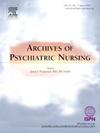儿童创伤对产后抑郁的影响:一项前瞻性队列研究
IF 2.2
4区 医学
Q1 NURSING
引用次数: 0
摘要
目的本研究旨在通过前瞻性的纵向评价,分析童年创伤对产后抑郁症(PPD)的影响。方法采用前瞻性队列研究,对产后两个阶段的妇女进行评估:产后初期和产后第三个月中下旬。数据采用儿童创伤问卷(CTQ)和爱丁堡产后抑郁量表(EPDS)收集,该问卷评估了五种类型的创伤(情感虐待、身体虐待、性虐待、情感忽视和身体忽视)。进行了广义估计方程(GEE)和调整多项逻辑回归。结果本研究包括153名完成两项评估的妇女。评估的儿童创伤类型在两个时间点显著影响PPD症状。随着时间的推移,PPD症状保持稳定,创伤暴露和时间之间没有显著的相互作用。发现情绪虐待、身体虐待、性虐待、情绪忽视和身体忽视是慢性PPD的显著预测因子。精神虐待、身体虐待和情感忽视也与早发性产后抑郁症有关。对于迟发性产后抑郁症,只有情感忽视和性虐待仍然是重要的预测因素。情绪虐待是早发性和慢性PPD的最重要的预测因子,而情绪忽视对晚发性PPD的影响最大。结论童年创伤对PPD有显著影响。此外,PPD症状随着时间的推移保持稳定。产后妇女PPD的早期筛查和怀孕期间儿童创伤的识别对于减轻PPD的危险因素至关重要。本文章由计算机程序翻译,如有差异,请以英文原文为准。
The influence of childhood trauma on postpartum depression: A prospective cohort study
Purpose
This study aimed to analyze the influence of childhood trauma on postpartum depression (PPD) through a prospective longitudinal evaluation.
Methods
A prospective cohort study was conducted with women evaluated at two postpartum periods: the immediate postpartum period and between the middle and end of the third month. Data were collected using the Childhood Trauma Questionnaire (CTQ) which assesses five types of trauma (emotional abuse, physical abuse, sexual abuse, emotional neglect, and physical neglect), and the Edinburgh Postnatal Depression Scale (EPDS). Generalized Estimating Equations (GEE) and adjusted multinomial logistic regressions were performed.
Results
This study included 153 women who completed both assessments. The type of childhood trauma evaluated significantly influenced PPD symptoms at both time points. The PPD symptoms remained stable over time, with no significant interaction between trauma exposure and time. Emotional abuse, physical abuse, sexual abuse, emotional neglect, and physical neglect were found to be significant predictors of chronic PPD. Emotional abuse, physical abuse, and emotional neglect are also associated with early onset PPD. For late-onset PPD, only emotional neglect and sexual abuse remained as significant predictors. Emotional abuse was the most influential predictor of both early-onset and chronic PPD, while emotional neglect had the greatest impact on late-onset PPD.
Conclusion
This study highlighted the significant influence of childhood trauma on PPD. Furthermore, PPD symptoms remained stable over time. Early screening for PPD in postpartum women and the identification of childhood trauma during pregnancy are essential to mitigate PPD risk factors.
求助全文
通过发布文献求助,成功后即可免费获取论文全文。
去求助
来源期刊
CiteScore
3.70
自引率
0.00%
发文量
131
审稿时长
160 days
期刊介绍:
Archives of Psychiatric Nursing disseminates original, peer-reviewed research that is of interest to psychiatric and mental health care nurses. The field is considered in its broadest perspective, including theory, practice and research applications related to all ages, special populations, settings, and interdisciplinary collaborations in both the public and private sectors. Through critical study, expositions, and review of practice, Archives of Psychiatric Nursing is a medium for clinical scholarship to provide theoretical linkages among diverse areas of practice.

 求助内容:
求助内容: 应助结果提醒方式:
应助结果提醒方式:


